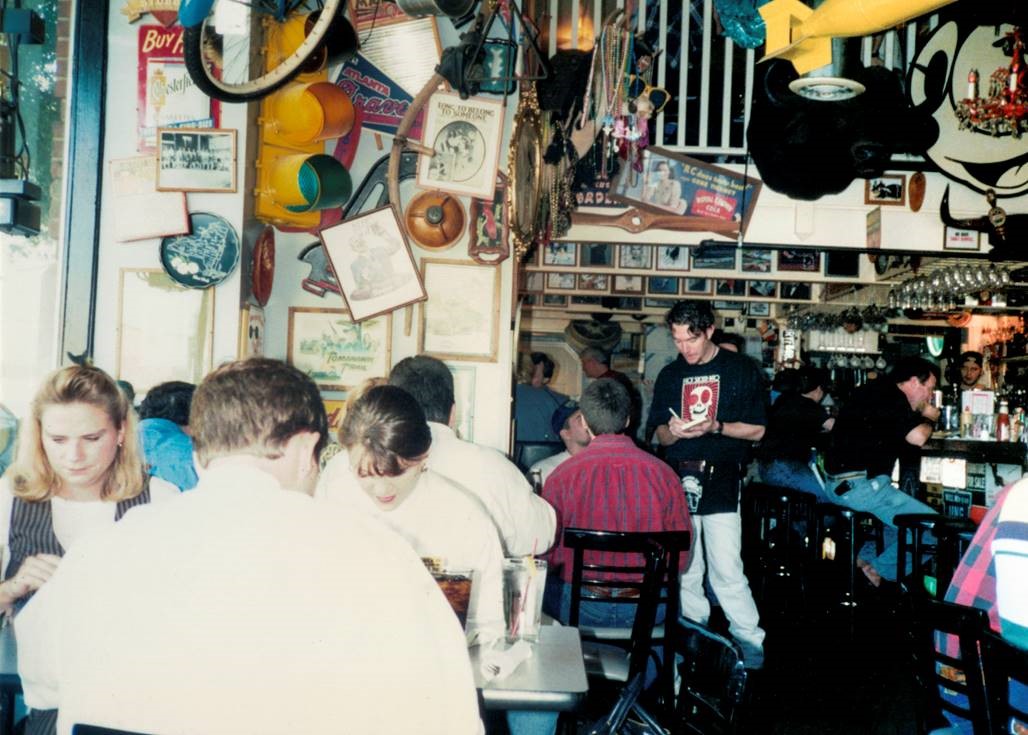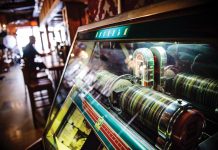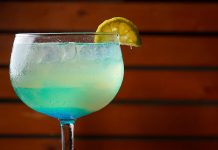
Photograph by Colin Murphy courtesy of the Vortex
Walk through the mouth of the one-story laughing zombie skull on Moreland Avenue in Little Five Points, and you’re inside the Vortex. Vintage beer cans line the dining room, kind of like how you “decorated” your college dorm room, but the Vortex’s are more painstakingly sourced for cool label designs. The rest of the room is a mish-mash of oddities—Jim Stacy would feel at home here—and the customers at the bar are drunk on 20-ounce beer pours, but friendly.
“Is that an Alabama tattoo?” asks one man.
“No, Sir,” says a woman with thin-framed glasses, heavy eyeliner, and a cigarette. “I do not like Alabama. That’s an Allman Brothers shirt you’ve got on, though.”
“Fuck yeah, it is.”
“Love the Allman Brothers.”
The bartender, who looks fresh off a Harley, sends shots of Jameson and Jaeger all around.
If you’ve been to either this or the Midtown location of the Vortex, this scene might feel familiar. It’s the scene owner Michael Benoit intended to create when he opened the first Midtown location (it’s since moved from the corner of West Peachtree and 11th streets to Peachtree Street between 7th and 8th) in 1992.
“Myself, my brother, Hank, and my sister, Suzanne, have very unique personalities,” says Benoit. “We’re not shy people.” A glance at the Vortex’s list of house rules proves that. The first-ever, titled Idiot-Free Zone, reads: “The customer is NOT always right. Anyone who acts like a great big jerk will be denied service and asked to leave our premises. It’s funny, but the people who behave badly always seem surprised when we toss their silly asses out the door. Probably because they’re idiots.”
The Benoits opened the the Vortex when Michael was 30, Hank was 35, and Suzanne was 42. None of the siblings had worked in the restaurant industry before, and they weren’t from Georgia, either. But they opened, and stayed open.
“The goal has always been to enjoy what we do, have a decent quality of life, and have some fun.” Below, Benoit talks more about his 25 years in business.

Photograph by Colin Murphy courtesy of the Vortex
You grew up in Los Angeles. Why the move to Atlanta?
I just got to the point in my life where I thought maybe there was some place I could live where I wouldn’t be stuck in traffic all the time and wouldn’t be poor constantly. So I took a driving tour of the Southeast, looking for a small town to move to that also had good weather. I would drive through these little towns and think, “Yeah, they’re real cute, but I don’t know that I could actually live here now.” I was 29. My last stop: I pulled into Atlanta and thought, “I could totally do this.”
How did you get your siblings here?
I’m not sure exactly how it happened, but we kept talking about how the bar scene in early 90s Atlanta was kind of booming: there were patios everywhere, people were out, [last call] was 4 a.m., there were 24-hour clubs in the city. It was just a really exciting time. And we thought, “Well, we like going to bars. In fact, we like going to bars more than going to a job, so why don’t we open a bar?” The first location was very tiny. Our logic was, “If we can’t make it work in this little tiny space, maybe we better go look for jobs.”
What were those early days like?
We bussed tables, we served. If we had to cook, we’d go downstairs and cook. We didn’t have any dish washing machines, so we washed everything by hand. We handled all the janitorial duties. We worked long, 16-hour days almost every day. We rented a house in Brookhaven and all lived together, but we were really only there to shower. We pooled our tips, and that was what we lived off of. In 1992, our rent for the house was $600 a month, so I had to come up with $200 a month to pay my rent. We ate at the bar. And that’s how it happened. We were all new to Atlanta at the time, so it was a way for us to meet people and become part of the fabric of the city.

Photograph courtesy of the Vortex
Was it trying, working with family?
What better business partners can you possibly have? I mean, we were raised right, you know? I know them, I trust them. People love to poop all over your dreams. People would tell us, “Working with family is usually a bad idea. There’s no possible way you’re going to make a living out of that place. It’s in a bad neighborhood.” We got it from all corners, but fortunately, we don’t pay attention to what people say.
How did you fund the Vortex in the beginning?
We scrapped it all together on an absolute shoestring budget. If we moved here today, I don’t think we could create a Vortex. It’s sad to say. The biggest amount of money we had came from my brother selling his interest on a house in California. But we had a little bit of debt when we opened up. So at that point my father said, “Listen, I want to sit down with you guys and go over your books.”
“I want you guys to be successful,” he said, “I know that growing up I wasn’t able to help you pay for college or any of those things, but now I have a little bit of money, so I’m going to loan you that money so that you don’t owe anybody, so that you can just worry about growing your business.”
Was he proud of you?
Absolutely. My parents are the salt of the earth, good folks, Depression-era children. Both of them are teetotalers—they’ve never smoked or drank in their entire lives—so when we said we wanted to open a bar, my father’s immediate reaction was, “I love that you want to open up a business, but maybe you might want to open a health food store?” But once we got it up and running, my parents could not have been prouder.

Photograph by Colin Murphy courtesy of the Vortex
Why did you want to serve burgers?
When we opened, we just wanted to be a bar. We weren’t even considering becoming a famous burger joint, but we thought, “Well we don’t want customers to get too drunk if they’re in here and we don’t have any food. And we don’t want people to leave if they get hungry.” So we made a burger. There were a couple of places in L.A. that we liked that had high-quality burgers, and there was nothing like that in Atlanta. We wanted to offer high-quality meat, thick patties, grilled over a flame—something that could be very good yet wouldn’t take a chef to produce. People have referred to us as the godfather of Atlanta burger joints because we kind of started it, and now the amount of places that either specialize in or offer gourmet burgers on their menu . . . it’s gone crazy. But I still personally eat a burger a week at least at the Vortex. I still think they’re pretty good.

Photograph courtesy of the Vortex
What’s the deal with all the rules?
Having never worked in this business, we assumed everybody was polite and everybody knew how to behave when they went out. Then we found that is not true! We were shocked, initially. I hadn’t realized there were so many people in the world who think it’s acceptable to be mean to service personnel. I learned that speaks huge volumes about someone’s personality. (If you’re ever on a date with someone and they’re mean to their server, run away! It means that person is an asshole.)
The purpose of going out, particularly to a little neighborhood pub, is to have a good time, not to show that you’re the boss of the people who work there. That’s why we refer to [our rules] as the idiot barometer; the only people who complain about it are the people we don’t want coming in anyway.
What do you look for in hiring staff?
We wanted fun, smart people who just had unique personalities and were going to be themselves. In the very early days people would say things like, “Would you have to have tattoos to work here?” And I was like, “No, but you have to be cool.” We didn’t care. Apparently back in the early 90s, sometimes a tattoo could keep you from being able to get a job. We didn’t care, we [still] don’t care. We look at people as individuals.
Looking back, is there anything you would have done differently?
I wish I would have had money in the early 90s and invested in real estate! I see buildings that I could have gotten for a song back in the day that are now [worth millions]. The gentrification has been amazing to watch. When I moved here, I really felt Atlanta was a small town. I was living in Midtown and there was so much land—empty lots. I thought, “This is crazy that I’m in the middle of the city and there’s so much vacant land.” Now that real estate is skyrocketing. Like I said, if we moved here today, we wouldn’t be able to do what we did.

Photograph courtesy of the Vortex
What’s the key to your success?
The three of us still work every day. We’ve always treated [the bar] like a business. I think a lot of these new folks [opening bars] lose sight of the fact that your business is your livelihood. You can walk into a bunch of places that have subway tile behind the bar and Edison bulbs and repurposed wood, but people relate to our funky little thrown-together places. We’re just working folks, this is our business, and we’re just trying to have a good time.
Today is the Vortex’s 25th anniversary. Guests will receive gift bags with Vortex T-shirts, 25th anniversary buttons, stickers, and more. And anyone who orders a Limited Edition Fat Elvis Imperial Stout or any Laughing Skull draft (the bar’s signature amber ale, produced by Red Brick Brewing) will receive receive a custom pint glass to take home.













